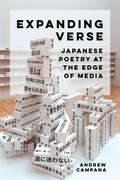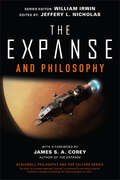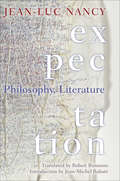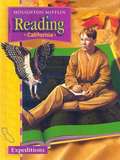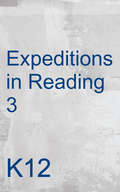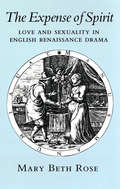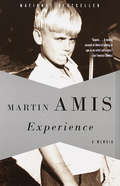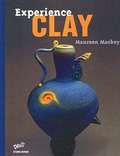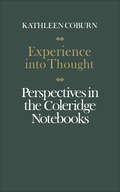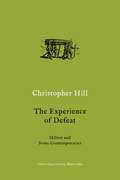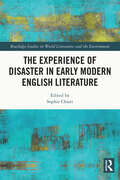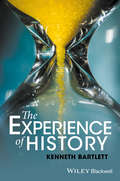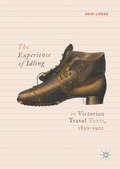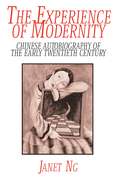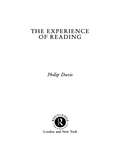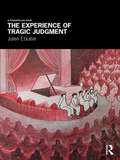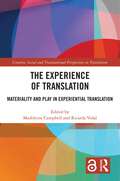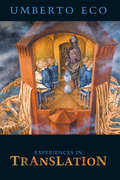- Table View
- List View
Expanding Verse: Japanese Poetry at the Edge of Media (New Interventions in Japanese Studies #6)
by Andrew CampanaA free ebook version of this title is available through Luminos, University of California Press's Open Access publishing program. Visit www.luminosoa.org to learn more.Expanding Verse explores experimental poetic practice at key moments of transition in Japan's media landscape from the 1920s to the present. Andrew Campana centers hybrid poetic forms in modern and contemporary Japan—many of which have never been examined in detail before—including the cinepoem, the tape recorder poem, the protest performance poem, the music video poem, the online sign language poem, and the augmented reality poem. Drawing together approaches from literary, media, and disability studies, he contends that poetry actively aimed to disrupt the norms of media in each era. For the poets in Expanding Verse, poetry was not a medium in and of itself but a way to push back against what new media technologies crystallized and perpetuated. Their aim was to challenge dominant conceptions of embodiment and sensation, as well as who counts as a poet and what counts as poetry. Over and over, poetic practice became a way to think about each medium otherwise, and to find new possibilities at the edge of media.
The Expanse and Philosophy: So Far Out Into the Darkness (The Blackwell Philosophy and Pop Culture Series)
by William IrwinEnter The Expanse to explore questions of the meaning of human life, the concept of justice, and the nature of humanity, featuring a foreword from author James S.A. Corey The Expanse and Philosophy investigates the philosophical universe of the critically acclaimed television show and Hugo Award-winning series of novels. Original essays by a diverse international panel of experts illuminate how essential philosophical concepts relate to the meticulously crafted world of The Expanse, engaging with topics such as transhumanism, belief, culture, environmental ethics, identity, colonialism, diaspora, racism, reality, and rhetoric. Conceiving a near-future solar system colonized by humanity, The Expanse provokes a multitude of moral, ethical, and philosophical queries: Are Martians, Outer Planets inhabitants, and Earthers different races? Is Marco Inaros a terrorist? Can people who look and sound different, like Earthers and Belters, ever peacefully co-exist? Should science be subject to moral rules? Who is sovereign in space? What is the relationship between human progress and aggression? The Expanse and Philosophy helps you answer these questions—and many more. Covers the first six novels in The Expanse series and five seasons of the television adaptation Addresses the philosophical issues that emerge from socio-economics and geopolitics of Earth, Mars, and the Outer Planets Alliance Offers fresh perspectives on the themes, characters, and storylines of The Expanse Explores the connections between The Expanse and thinkers such as Aristotle, Kant, Locke, Hannah Arendt, Wittgenstein, Descartes, and Nietzsche Part of the popular Blackwell Philosophy and Pop Culture series, The Expanse and Philosophy is a must-have companion for avid readers of James S.A. Corey’s novels and devotees of the television series alike.
Expectation: Philosophy, Literature
by Jean-Michel Rabaté Jean-Luc Nancy Robert BononnoExpectation is a major volume of Jean-Luc Nancy’s writings on literature, written across three decades but, for the most part, previously unavailable in English. More substantial than literary criticism, these essays collectively negotiate literature’s relation to philosophy. Nancy pursues such questions as literature’s claims to truth, the status of narrative, the relation of poetry and prose, and the unity of a book or of a text, and he addresses a number of major European writers, including Dante, Sterne, Rousseau, Hölderlin, Proust, Joyce, and Blanchot. The final section offers a number of impressive pieces by Nancy that completely merge his concerns for philosophy and literature and philosophy-as-literature. These include a lengthy parody of Valéry’s “La Jeune Parque,” several original poems by Nancy, and a beautiful prose-poetic discourse on an installation by Italian artist Claudio Parmiggiani that incorporates the Faust theme. Opening with a substantial Introduction by Jean-Michel Rabaté that elaborates Nancy’s importance as a literary thinker, this book constitutes the most substantial statement to date by one of today’s leading philosophers on a discipline that has been central to his work across his career.
Expeditions
by J. David Cooper John J. Pikulski Kathryn Au David J. Cha Gilbert Garcia Claude Goldenberg Phyllis Hunter Marjorie Y. Lipson Shane Templeton Sheila Valencia Maryellen VogtNIMAC-sourced textbook
Expeditions 5th Grade (California)
by J. David Cooper John J. Pikulski Kathryn AuLiterature textbook
Expeditions (California)
by J. David Cooper John J. Pikulski Patricia A. AckermanNIMAC-sourced textbook
The Expense of Spirit: Love and Sexuality in English Renaissance Drama
by Mary Beth RoseA public and highly popular literary form, English Renaissance drama affords a uniquely valuable index of the process of cultural transformation. The Expense of Spirit integrates feminist and historicist critical approaches to explore the dynamics of cultural conflict and change during a crucial period in the formation of modern sexual values. Comparing Elizabethan and Jacobean dramatic representations of love and sexuality with those in contemporary moral tracts and religious writings on women, love, and marriage, Mary Beth Rose argues that such literature not only interpreted sexual sensibilities but also contributed to creating and transforming them.
Experience: A Memoir (Vintage International)
by Martin AmisNATIONAL BESTSELLER • One of the most gifted and innovative writers of our time discloses a private life every bit as unique and fascinating as his bestselling novels.&“Superb memoir...a moving account of [Amis&’s] coming of age as an artist and a man.&” —San Francisco Chronicle The son of the great comic novelist Kingsley Amis, Martin Amis explores his relationship with this father and writes about the various crises of Kingsley's life. He also examines the life and legacy of his cousin, Lucy Partington, who was abducted and murdered by one of Britain&’s most notorious serial killers. Experience also deconstructs the changing literary scene, including Amis' portraits of Saul Bellow, Salman Rushdie, Allan Bloom, Philip Larkin, and Robert Graves, among others. Not since Nabokov's Speak, Memory has such an implausible life been recorded by such an inimitable talent. Profound, witty, and ruthlessly honest, Experience is a literary event.
Experience and Teleology in Ancient Historiography
by Jonas GrethleinThe past is narrated in retrospect. Historians can either capitalize on the benefit of hindsight and give their narratives a strongly teleological design or they may try to render the past as it was experienced by historical agents and contemporaries. This book explores the fundamental tension between experience and teleology in major works of Greek and Roman historiography, biography and autobiography. The combination of theoretical reflections with close readings yields a new, often surprising assessment of the history of ancient historiography as well as a deeper understanding of such authors as Thucydides, Tacitus and Augustine. While much recent work has focused on how ancient historians use emplotment to generate historical meaning, Experience and Teleology in Ancient Historiography offers a new approach to narrative form as a mode of coming to grips with time.
Experience Clay
by Maureen MackeyLEVEL: 6th form onwards. This contemporary guide to clay techniques, tools, and traditions is as inspirational as it is practical. Supported by a clear, step-by-step illustrations, this comprehensive resource details a range of hand building and wheel throwing techniques. From the properties of clay to decoration and firing, all information presented is shown against a rich backdrop of dynamic professional and student work. While encouraging students of varying abilities to explore their own unique style and interests, basic to advanced studio opportunities highlight teaching tips and safety notes at point of use. Friendly and definitive, this stimulating guide to clay is ideal as an introductory text for a studio course from Art I to Ceramics IV. The student text explores ancient traditions and historic innovations. It also includes carefully crafted lessons organised for success in creating art and mastering key concepts and skills while introducing students to: Contemporary masters; Cutting-edge works of art; New media; Techniques and safety precautions; Current careers in art.
Experience Clay
by Maureen MackeyLEVEL: 6th form onwards. This contemporary guide to clay techniques, tools, and traditions is as inspirational as it is practical. Supported by a clear, step-by-step illustrations, this comprehensive resource details a range of hand building and wheel throwing techniques. From the properties of clay to decoration and firing, all information presented is shown against a rich backdrop of dynamic professional and student work. While encouraging students of varying abilities to explore their own unique style and interests, basic to advanced studio opportunities highlight teaching tips and safety notes at point of use. Friendly and definitive, this stimulating guide to clay is ideal as an introductory text for a studio course from Art I to Ceramics IV. The student text explores ancient traditions and historic innovations. It also includes carefully crafted lessons organised for success in creating art and mastering key concepts and skills while introducing students to: Contemporary masters; Cutting-edge works of art; New media; Techniques and safety precautions; Current careers in art.
Experience into Thought: Perspectives in the Coleridge Notebooks
by Kathleen CoburnColeridge is admired as a genius and derided as an opium addict and plagiarist. The aim here has been to examine his experiences, moods, thoughts, and reactions as a whole and their relation to poems such as Christabel, the Ancient Mariner, and the Dejection ode, and to his prose works, and also to look at many of his own statements made mainly in the privacy of his notebooks about his aims and purposes. The result of the new compound should alter some of the uninformed and prejudiced generalizations about Coleridge. The new picture is of a man and poet more human, more inquiring, more sceptical, whose strength and intellectual stature can fully be understood only against a background of suffering and loneliness; a critical, radical imagination is seen not only struggling to survive but to achieve creatively in the process.One of the world's pre-eminent Coleridge scholars, Kathleen Coburn brings a long association with and intimate knowledge of Coleridge's writings, both published and unpublished, to this sensitive study of a complex mind and personality.
The Experience of Defeat: Milton and Some Contemporaries
by Christopher HillWhat lessons can we learn from the defeat of the seventeenth century English revolution?The failure of the English Revolution in 1660 provoked a variety of responses among radical clergy, intellectuals and writers, as they struggled to accept and account for their defeat in the light of divine providence. Christopher Hill's close analysis of the writings of the Levellers and Diggers, of Fox and other important early Quakers suggests that the revolutionary beliefs and savage social judgments and disillusionments that Milton expressed in his writings at the time were shared by many of his contemporaries. Hill makes a provocative case, as well, that Milton's three great poems--Paradise Lost, Paradise Regained, and Samson Agonistes--came directly out of his painful reassessment of man and his society, and of society's relation to moral order.From the Trade Paperback edition.
The Experience of Disaster in Early Modern English Literature (Routledge Studies in World Literatures and the Environment)
by Sophie ChiariThis book addresses the concept of ‘disaster’ through a variety of literary texts dating back to the early modern period. While Shakespeare’s age, which was an era of colonisation, certainly marked a turning point in men and women’s relations with nature, the present times seem to announce the advent of environmental justice in spite of the massive ecological destructions that have contributed to reshape our planet. Between then and now, a whole history of climatic disasters and of their artistic depictions needs to be traced. The literary representations of eco-catastrophes, in particular, have consistently fashioned the English identity and led to the progress of science and the ‘advancement of learning’. They have also obliged us to adapt, recycle and innovate. How could the destructive process entailed by ecological disasters be represented on the page and thereby transformed into a creative process encouraging meditation, preservation and resilience in the sixteenth and seventeenth centuries? To this question, this book offers nuanced, contextualised and perceptive answers. Divided into three main sections ‘Extreme Conditions’, ‘Tempestuous Skies’, and ‘Biblical Calamities,' it deals with the major environmental issues of our time through the prism of early modern culture and literature.
The Experience of History: An Introduction To History
by Kenneth BartlettThe Experience of History is a lively and passionate introduction to the field that encourages students to seek and appreciate history inside the classroom and beyond. This work: Defines history as a discipline and the role of historians within it Addresses the analytical and critical thinking skills needed to engage with the past Discusses a variety of important topics in the study of history, such as historical evidence, primary documents, divisions of history, forms of historical writing, historiographical traditions, and recent categories of historical research Written by a renowned scholar of European history, this work helps students to become discerning examiners of history and historical evidence in a variety of modern settings like art, architecture, film, television, politics, current events, and more.Learn more about the author and his passion for history in this interview with popular blog Five Books: http://fivebooks.com/interview/ken-bartlett-renaissance-books/.
The Experience of Idling in Victorian Travel Texts, 1850–1901
by Heidi LiedkeThis book brings together theories of spatiality and mobility with a study of travel writing in the Victorian period to suggest that ‘idleness’ is an important but neglected condition of subjectivity in that era. Contrary to familiar stereotypes of ‘the Victorians’ as characterized by speed, work, and mechanized travel, this books asserts a counter-narrative in which certain writers embraced idleness in travel as a radical means to ‘re-subjectification’ and the assertion of a ‘late-Romantic’ sensibility. Attentive to the historical and literary continuities between ‘Romantic’ and ‘Victorian’, the book reconstructs the Victorian discourse on idleness. It draws on an interdisciplinary range of theorists and brings together a fresh selection of accounts viewed through the lens of cultural studies as well as accounts of publication history and author biography. Travel texts from different genres (by writers such as Anna Mary Howitt, Jerome K. Jerome and George Gissing) are brought together as representing the different facets of the spectrum of idleness in the Victorian context.
The Experience of Modernity: Chinese Autobiography of the Early Twentieth Century
by Janet NgAutobiography of the first half of the twentieth century was used variously by different groups of writers to interrogate, negotiate, and even to program the social and political progress of China. However, despite the popularity and success of this genre, it has also been the most forgotten in literary and historical discussions. Personal stories and individual expressions seem to have had no place in 1920s, 1930s, and 1940s China, smothered instead by the grander rhetoric of nationalism. For this reason, autobiography's popularity during the era is an odd phenomenon and also an important genre for study. The May Fourth Era (1917-40) began as a movement to make the classical literary language accessible to the common people and became a broader political movement against imperialism. The writing of autobiography was influenced by the idea of literature's social and political mission, yet at the same time autobiography was a uniquely potent venue for individual expression. Janet Ng examines this notion in The Experience of Modernity within the framework of autobiographical writings by Chen Hengzhe, Lu Xun, Hu Shi, Xie Bingying, Xiao Hong, Eileen Chang, Yu Dafu, and Shen Congwen. Janet Ng is Assistant Professor of Asian Literature, the College of Staten.
Experience Of Reading
by Philip DavisFirst published in 1991. Routledge is an imprint of Taylor & Francis, an informa company.
The Experience of Tragic Judgment
by Julen EtxabeAdjudication between conflicting normative universes that do not share the same vocabulary, standards of rationality, and moral commitments cannot be resolved by recourse to traditional principles. Such cases are always in a sense tragic. And what is called for, in our pluralistic and conflictual world is not to be found, as many would suppose, in an impersonal set of procedures with which all participants could be treated as having rationally agreed. The very idea of such a neutral system is an illusion. Rather, what is needed, Julen Etxabe argues in this book, is a heightened awareness of the difficulty of judgment. The Experience of Tragic Judgments draws upon Sophocles’ play Antigone in order to consider this difficulty and the virtues that attend its acknowledgment. Based on the transformative experience that the audience undergoes in engaging with this play what is proposed is a reconceptualization of judgment: not as it is generally thought to occur in a single isolated moment, like the falling of an axe, but rather as an experience that develops in and through space and time.
The Experience of Translation: Materiality and Play in Experiential Translation (Creative, Social and Transnational Perspectives on Translation)
by Madeleine CampbellCampbell, Vidal and their contributors expand the notion of translation beyond linguistic, modal and medial borders to embrace posthumanist perspectives through a holistic experiential epistemology which envisions translation as engaged, situated social practice.The first of two volumes, this book focuses on questions of materiality and play. Drawing together contributions on theory, methodology and practice from translators, scholars and practitioners working in the creative and performing arts, this book explores how contemporary, experiential acts of interpretation, mediation and negotiation can serve to bridge social and cultural discontinuities across time and space. These range from ancestral past to digital present, from rural to urban environments across the globe. Experiential translation applies a transdisciplinary lens to problematize views of translation and untranslatability traditionally bound by structuralist frames of reference and the reserve of professional linguistic translation. The chapters in this book apply this experiential lens to understand a pluriverse of creative translation practices where the translator’s subject position in relation to the ‘original’ is transformed by the role of experimentation, creativity and play. This book and its companion volume The Translation of Experience: Cultural Artefacts in Experiential Translation will be of particular interest to translators and arts practitioners, scholars and researchers in the transdisciplinary field of humanities.Funding: This work was supported by UKRI under AHRC Grant AH/V008234/1, awarded to Ricarda Vidal, King’s College London (Principal Investigator) and Madeleine Campbell, University of Edinburgh (Co-Investigator).
Experiences in Translation
by Umberto Eco Alastair McewenIn this book Umberto Eco argues that translation is not about comparing two languages, but about the interpretation of a text in two different languages, thus involving a shift between cultures. An author whose works have appeared in many languages, Eco is also the translator of Gérard de Nerval's Sylvie and Raymond Queneau's Exercices de style from French into Italian. In Experiences in Translation he draws on his substantial practical experience to identify and discuss some central problems of translation. As he convincingly demonstrates, a translation can express an evident deep sense of a text even when violating both lexical and referential faithfulness. Depicting translation as a semiotic task, he uses a wide range of source materials as illustration: the translations of his own and other novels, translations of the dialogue of American films into Italian, and various versions of the Bible. In the second part of his study he deals with translation theories proposed by Jakobson, Steiner, Peirce, and others.Overall, Eco identifies the different types of interpretive acts that count as translation. An enticing new typology emerges, based on his insistence on a common-sense approach and the necessity of taking a critical stance.
